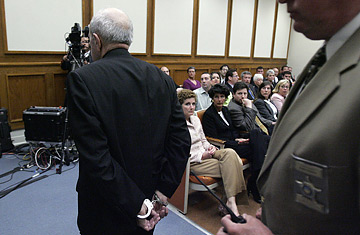
The jury watches convicted murderer Father Gerald Robinson leave the courtroom where he was tried in the satanic-style murder of a 71-year-old nun.
They deserved some help. Like the overwhelming majority of American jurors in murder and abuse cases, the 14 Austin jurors had to face unspeakable horrors without the benefit of the psychological assistance afforded to both policemen and victims. Cave has turned to State Rep. Juan Garcia to sponsor a bill funding a jury counseling program in Texas state courts for those cases where graphic, disturbing evidence is often featured — homicide cases, sexual offenses, family-relations crimes such as child abuse. The bill, which would give additional funds to victims' assistance programs, is gaining support in the legislature. While victims' advocates and some members of the legal community, including judges and prosecutors, have pushed for counseling on an ad hoc basis, there has been little formal, funded support for post-trial jury counseling in most federal and state courts.
"We have come to take jurors for granted," Cave says. "They saw the pictures over and over again, pictures I have never seen. I asked 14 people to take my pain and the hell that doctors and psychologists and friends have begged me not to look at. I watched as the days went on and I began to see people who had not slept, people with dark circles and pallor, people with nervous twitching."
Cave knows those kinds of symptoms all too well. In August of 2005, her 21-year-old daughter Jennifer was killed by Colton Pitonyak, 22, a University of Texas finance major with a drug habit. Jennifer had dropped out of college, but was trying to get her own life back on track after some problems with drugs and had begun work as a legal assistant. After Jennifer failed to return home from a dinner out with Pitonyak, Sharon, a Corpus Christi small business owner, and her boyfriend, Jim Sedwick, drove to Austin and began the search. When a tip led them to Pitonyak's apartment, police declined to enter the locked door with no evidence of a crime. Instead, Sedwick broke in and soon came out to tell Cave he had found Jennifer, recognizing the freckles on her daughter's feet. At first Cave said she did not understand — "Why her feet?" — that Sedwick was simply trying to cushion her from the horrible truth.
Two years later, after Pitonyak was given a life sentence for the murder, Austin firemen and policemen who followed Sedwick into the apartment are still undergoing counseling, Cave says. Sedwick and her family are also being counseled by therapists and the family priest. But all that help still can't prevent daily, commonplace events from triggering the horrible memories. "We don't eat anything in our house that is carved and there is a certain type of garbage bag with a red cinch that we don't use," Cave says.
As agonizing as the recounting of her daughter's murder during the trial was to bear for Cave herself, she also worried about the jurors, four of whom weren't yet 30 years old. At one point during the trial a young juror cried softly all day. Soon after the verdict Cave begin researching the issue of juror counseling, and what she found was not much comfort. Jury counseling, or debriefing as it is sometimes called, has been used in several high-profile cases including the trial of Jeffrey Dahmer and the Oklahoma City bombing case, according to the National Center for State Courts in Arlington, Va. But there is no institutionalized system at either the state or federal court level and only one formal, funded debriefing program in the country — Seattle, Washington's King County court system, which has an ongoing contract with a local mental health center.
"The first instinct we have when we see or hear something disturbing is to talk about it with someone, but jurors are told not to do that," says Sue Covey, an employee assistance manager with APS Healthcare, who helped King County set up its debriefing system. Jurors who have suffered through the silence often have post-traumatic stress symptoms, nightmares and dreams, spontaneous crying and depression, even thoughts of suicide. Recognizing those symptoms and being told where to seek help is vital, Covey said.
After the proposed legislation was announced, Cave says she was overwhelmed with e-mails and phone calls from jurors across the state who had been haunted by what they saw and heard during their service. "My heart goes out to them. These are people who are trying to do their job — people like me, people with a couple of kids who have to go home from this each day and cook supper, do homework," Cave says. "The more they are told not to talk about something, the harder it becomes to ever talk about it."
Cave is celebrating her daughter's 23rd birthday by lobbying Texas legislators and hoping that by the time an alleged accomplice goes on trial this summer, the counseling program will be in place. "Jennifer is gone, but the life she had remains," Cave says. "I tried to give everything in my heart to those jurors, and it would be a travesty if we don't take care of them. But as they say, tragedy is often the catalyst for change."
